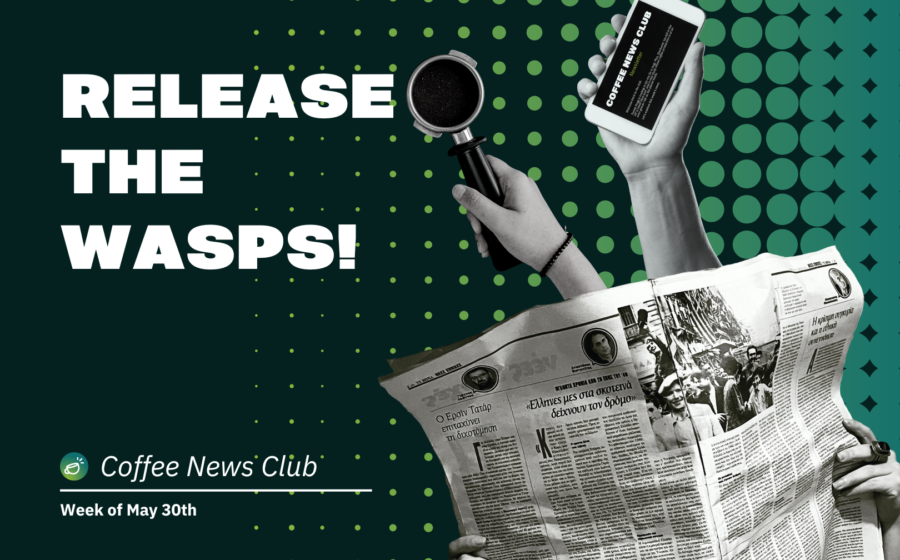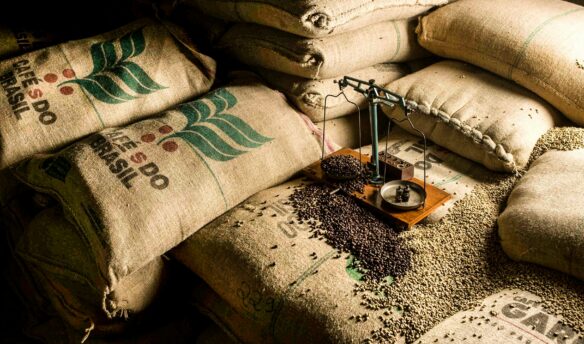Bees and wasps are here to help! Hawaii plans to release tiny wasps to fight coffee berry borers, and attracting pollinators to your farm can lead to colossal profits. Plus, the head of Workers United calls on Starbucks to negotiate once and for all.
‘Hawaii Coffee Researchers Prepare to Unleash the Wasps’ – via Daily Coffee News
Coffee producers hope a tiny, parasitic wasp can save their farms. Hawaiian officials just got the go-ahead from the Department of Agriculture to release wasps to fight coffee berry borer (CBB), a pest that devastates coffee plants by burrowing into and feeding on the cherry. If uncontrolled, CBB can attack between 50-100% of cherries on a farm.
The microscopic wasps, named Phymastichus coffea, are originally from Africa and have proven effective at killing CBB populations in parts of Latin America. The wasps’ larvae eat the adult borer beetles before they drill into the coffee cherries. Researchers from the University of Hawaii have been conducting tests to ensure that the wasps don’t harm native species in their quest to devour the coffee pest.
“This biological control agent has the potential to make significant positive economic impacts in the Hawaii coffee industry and offers an environmentally safe way to manage CBB,” said Mark Wright, a professor of Entomology at the University of Hawaii at Manoa. “We tested on 43 inactive and beneficial species, and confirmed that P. coffea doesn’t attack any native species of insects.”
The wasp plan is Hawaii’s latest attempt to stop CBB, which has decimated coffee production worldwide and first made its way to the islands in 2010. The federal government has spent millions funding research into the issue over the past decade, but CBB is still thriving. Having determined that the wasps won’t cause any unintended environmental damage, university researchers and scientists from the USDA Agricultural Research Service will begin releasing the wasps in the coming months.
‘El Niño Seen Posing Larger Risk for Robusta Coffee, Less to Arabica’ – via Reuters
Forecasters predict the development of the El Niño weather pattern could potentially impact coffee production in 2023. Analysts expect regions that focus on growing robusta to be most affected, with arabica-growing regions anticipated to escape the worst.
El Niño is the warm phase of the El Niño–Southern Oscillation, a climate phenomenon that develops in the Pacific Ocean and can disrupt temperature and rainfall patterns (the cool phase is known as La Niña). The impacts can be spread along the equator, bringing hotter and drier weather to coffee regions on both sides of the Pacific Ocean. Forecasters expect Vietnam and Brazil, the two largest robusta-producing countries, to suffer losses if a strong El Niño develops.
While a weak El Niño might lead to small temperature increases and moderate local effects on weather, a strong El Niño could mean widespread impacts, with much higher temperatures and changed rainfall patterns, specifically drought.
The last time a strong El Niño struck Brazil, between 2015 and 2016, robusta production dropped 40% due to an extended drought in the state of Espirito Santo. Today the area is better prepared due to investments in irrigation, but extended dry weather could still affect harvests. Vietnam is also expecting record high temperatures if El Niño develops, which Reuters says is partly why robusta prices have climbed in recent weeks.
Forecasters anticipate that arabica-producing regions will be spared the worst of the effects, noting that “Central and South American producers that have suffered from excess rains during the last three years of La Niña are seen having more normal weather.”
Northern Brazil, closer to the equator, is one of the largest robusta-producing regions, while the southern half of the country grows mainly arabica. Analysts hope that El Niño will reduce the risk of frost in Brazil, although higher temperatures at the wrong time could hurt coffee plants during the flowering stage around September.
‘Coffee, Brought to You by Bees: a Case Study in How Restoring Habitat is a Win-Win for Forests and Farmers’ – via The Conversation
Trees are good. Bees are good. Coffee is (obviously) good. Put all these things together, and you get improved coffee harvests, according to new research from the University of Melbourne in Australia.
Bees are essential to food production, pollinating many crops such as almonds, watermelons, cucumbers—and coffee. However, pollinator numbers are plummeting, and many face extinction due in part to expanding monoculture agriculture (basically more and more farms grow just one kind of crop, which affects the pollinators’ ability to thrive). Restoring their habitat is essential, for them and for us—without pollinators, our food systems would be drastically altered.
The study, published in PLOS Biology, shows that coffee producers who restore small areas across their farms can nearly double their profits due to increased yields with just a slight increase in forest cover. These benefits continue to amass over the long term, with results showing that “strategic restoration can increase forest cover by approximately 20% while doubling collective landholder profits over 40 years.”
“We show that restoration can provide immense economic benefits in the long run,” the authors write, “which may be pivotal to motivating local landholders to undertake conservation endeavors in pollinator-dependent croplands.”
The study had two objectives: to maximize coffee profitability and restore forests to be suitable for pollinators. They found a sweet spot that balanced the two: “We found coffee farms can increase economic benefits by 98% after five years by increasing forest area by 15%. After 40 years, the economic benefits increase by about 109% with a 19% increase in forest area.”
Reforestation, however, costs money, and the study authors suggest that farmers be given financial support to begin the process. “Ideally, farmers who have large patches restored on their land would receive financial compensation,” the authors write. “This could make up for the farmers’ upfront and ongoing costs, such as sapling cost and labor to maintain plants throughout some years.”
More News
‘Trader Joe’s Recalls Instant Cold Brew Due to Potential Glass’ – via Daily Coffee News
‘Wrexham AFC Welcomes SToK Cold Brew as Official Stadium Sponsor’ – via BevNet
‘A Disposable Coffee Cup That You Can Eat’ via Sprudge
‘Brazil Coffee Harvest Picking Up, Only Slightly Below Normal’ – via Reuters
‘Oktober Model 8-H Can Seamer Gives Roasted Specialty Coffee a Spin’ – via Daily Coffee News
‘Let’s Talk Coffee Celebrates its 19th Edition’ – via Global Coffee Report
‘Submissions Are Now Open For The 2023 Build-Outs Of Coffee’ – via Sprudge
The Week in Coffee Unionizing
For over a year, organizers with Starbucks Workers United have been trying to negotiate contracts for its 300+ unionized locations. At every turn, however, they have been stymied by the company’s delay tactics, including refusing to negotiate via Zoom, insisting on bargaining store-by-store, and persistently walking out of negotiations. The union president has now called on Starbucks to negotiate one nationwide contract.
“The fastest way to do it is in a national framework at one table and bargain these universal issues concurrently,” said Lynne Fox, president of Workers United. Fox wants Starbucks to agree to a broad contract including a national minimum wage, fair scheduling procedures, and guaranteed minimum hours, among other demands. Stores could then add supplemental agreements if they chose.
Starbucks says that since the union has insisted on individual elections, they should also have to negotiate each store’s contract individually. “This is a deliberate attempt to distract from Workers United’s failure or inability to bargain for nearly 300 single stores, as they successfully litigated and enforced on Starbucks,” a spokesperson told HuffPost.
In a letter to Starbucks’ general counsel, Fox noted that during Howard Schultz’s recent Senate testimony, the ex-CEO had bemoaned the single-store bargaining process saying it had created “significant complications and obstacles in the collective bargaining process.”
“I can only speculate [as to Starbucks’ motives], but my guess is to purposely complicate the process and elongate the process,” Fox told HuffPost. “If you want to bargain in good faith, that’s not the way you do it.”
In other Starbucks union news this week:
- Students at the University of Washington, along with staff and alumni, are asking the school to switch suppliers when its contract with Starbucks ends in June. “It’s time for the University of Washington to say once and for all that we stand by our mission as an institution of higher education, that we believe in workers’ rights, so we commit to cutting our campus ties with Starbucks, as they are a union-busting corporation that has repeatedly violated labor law,” the letter reads in part. It’s the latest in a growing list of colleges that are coming under pressure to cancel or switch away from Starbucks due to the company’s anti-union activity.
- The number of unionized stores keeps ticking up: a Starbucks store in New Hampshire, as well as several in California, voted to join the union, with many more officially announcing their intent. According to data from UnionElections.org, the total number of unionized Starbucks nationwide is currently 307.
Beyond the Headlines
‘The Enduring Significance of Bookstore Cafés’ by Rachel Sandstrom Morrison
‘People Who Love Robot Baristas Don’t Get What Coffee Shops Are For’ by Ashley Rodriguez







